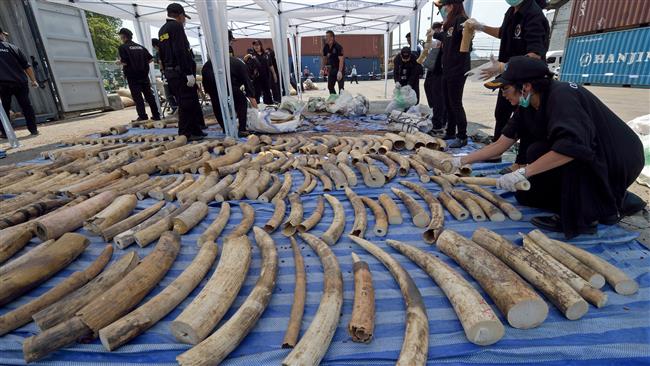Four metric tons of African elephant ivory worth about THB200 million has been seized at a Bangkok port in a container labeled as beans, Thai customs said Monday, in the kingdom’s largest-ever haul of its kind.
The 739 pieces of tusk were found stashed in a container which arrived at the port on April 18 after being shipped from the Democratic Republic of Congo destined for Laos, according to Somchai Satjapong of the Customs Department.
“The pieces weigh around 4,000 kilograms and are worth around THB200 million ($6 million)… it is the biggest ivory seizure in Thai history,” the statement said, adding they had been declared on the cargo list as beans.
Once in neighboring Laos, authorities believe the ivory would likely be sold on to buyers from China, Vietnam or back into Thailand, countries where ivory ornaments remain highly prized despite fears the trade is pushing wild elephants to extinction. Somchai said the tusks seized Monday would be held by the National Parks, Wildlife and Plants Conservation Department. The Laos company they were headed to is now blacklisted and the department would ask Lao authorities to investigate it.
Under Thai law, registered ivory from domesticated Thai elephants can be sold. But experts say that loophole allows criminal gangs to launder poached African ivory through the kingdom.
Thai authorities say they have stepped up seizures of illegal ivory after global regulator CITES threatened an international ban on the kingdom’s entire wildlife business if it failed to curb the trade in tusks on its soil.
Last year the Convention on International Trade in Endangered Species of Wild Fauna and Flora (CITES) set Thailand an August 2015 deadline to fall into line or risk wide-ranging sanctions.
A ban would prevent the country trading anything appearing on that list with another country, including orchids and exotic wood which are significant export products for Thailand.
Conservationists say poaching and conflict has decimated the number of African elephants in the wild, prompting experts to warn the species could be wiped out within decades.
Story/Photo: AFP




